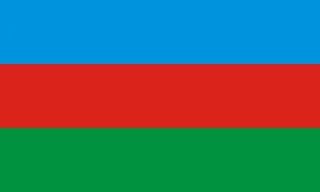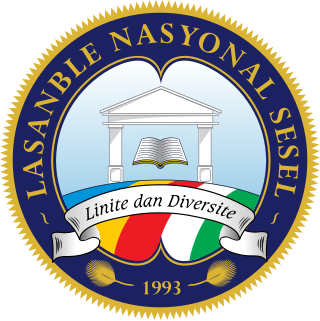
Politics of Gabon takes place in a framework of a republic whereby the President of Gabon is head of state and in effect, also the head of government, since he appoints the prime minister and his cabinet. The government is divided into three branches: the Executive (headed by the prime minister, the legislative that is formed by the two chambers of parliament. The judicial branch, like other two branches, is technically independent and equal to other three branches, although in practice, since its judges are appointed by the president, it is beholden to the same president. Since independence the party system is dominated by the conservative Gabonese Democratic Party.

Politics of Seychelles takes place in a framework of a presidential republic, whereby the President of Seychelles is both head of state and head of government, and of a multi-party system. Executive power is exercised by the government. Legislative power is vested in both the government and the National Assembly.

The African Christian Democratic Party is a South African political party founded in 1993. It consists mainly of conservative Christians and its doctrine concentrates mostly on social issues such as abortion, homosexuality and pornography. The leader of the party is Kenneth Meshoe. As of 2018, the ACDP has three members in the South African Parliament, one member in the Western Cape Legislature and 22 municipal councillors across the country.

The National Assembly is the de jure legislature for Venezuela that was first elected in 2000. It is a unicameral body made up of a variable number of members, who were elected by a "universal, direct, personal, and secret" vote partly by direct election in state-based voting districts, and partly on a state-based party-list proportional representation system. The number of seats is constant, each state and the Capital district elected three representatives plus the result of dividing the state population by 1.1% of the total population of the country. Three seats are reserved for representatives of Venezuela's indigenous peoples and elected separately by all citizens, not just those with indigenous backgrounds. For the 2010-2015 period the number of seats was 165. All deputies serve five-year terms. The National Assembly meets in the Federal Legislative Palace in Venezuela's capital, Caracas.

The Grand National Assembly of Turkey, usually referred to simply as the TBMM or Parliament, is the unicameral Turkish legislature. It is the sole body given the legislative prerogatives by the Turkish Constitution. It was founded in Ankara on 23 April 1920 in the midst of the National Campaign. The parliament was fundamental in the efforts of Mareşal Mustafa Kemal Atatürk, 1st President of the Republic of Turkey, and his colleagues to found a new state out of the remnants of the Ottoman Empire.

The Parliament of Pakistan is the federal and supreme legislative body of Pakistan. It is a bicameral federal legislature that consists of the Senate as the upper house and the National Assembly, as the lower house. According to the constitution of Islamic Republic of Pakistan, the President of Pakistan is also a component of the Parliament. The National Assembly is elected for a five-year term on the basis of adult franchise and one-man one-vote. The tenure of a Member of the National Assembly is for the duration of the house, or sooner, in case the Member dies or resigns. The tenure of the National Assembly also comes to an end if dissolved on the advice of the Prime Minister or by the president in his discretion under the Constitution.

Elections in Angola take place within the framework of a multi-party democracy and a presidential system. The National Assembly is directly elected by voters, whilst the leader of the largest party or coalition in the National Assembly automatically becomes President. The country is currently a one-party dominant state, with the MPLA as the dominant party.
The Indian National Lok Dal (INLD) is a political party in India, in the state of Haryana. INLD was founded in October 1996 as Haryana Lok Dal (Rashtriya) by Choudhary Devi Lal, who served as Deputy Prime Minister of India in the V.P. Singh's Cabinet and Chief Minister of Haryana twice. His son Om Prakash Chautala is the president.

The Lok Janshakti Party (LJP) is a state political party in the state of Bihar, India. It is led by Ram Vilas Paswan. The party was formed in 2000 when Paswan split from Janata Dal (United). The party has considerable following amongst Dalits in Bihar. Currently the party is a member of the National Democratic Alliance.

There have never been national elections in Eritrea since independence in 1993. In theory, elections select representatives from the country's six regions for the National Assembly. Elections would also occur to elect representatives for the country's regional assemblies and other posts within the country's districts. However, only local elections have been held, most recently in April 2014.
India is a federation with a parliamentary system governed under the Constitution of India, which defines the power distribution between the union, or central, government and the states.

The Parliament of Ghana is the legislative body of the Government of Ghana.

The unicameral National Assembly is the Seychelles's legislative body.

The Prime Minister of the Kingdom of Cambodia is the head of government of Cambodia. The prime minister is also the chairman of the Cabinet and leads the executive branch of the Royal Cambodian Government. The prime minister is required to be a member of parliament, and is appointed by the monarch for a term of five years. Since 1945, 36 individuals have served as prime minister.
State elections were held in South Australia on 11 December 1993. All 47 seats in the South Australian House of Assembly were up for election. The incumbent Australian Labor Party led by Premier of South Australia Lynn Arnold was defeated by the Liberal Party of Australia led by Leader of the Opposition Dean Brown. The Liberals won what is still the largest majority government in South Australian history.

The National Assembly is the elected lower house of Bhutan's new bicameral Parliament which also comprises the Druk Gyalpo and the National Council. It is the more powerful house.

General elections were held in Pakistan on 6 October 1993. The election took place after both the Prime Minister Nawaz Sharif and President Ghulam Ishaq Khan resigned to resolve a power struggle between them. Although the Pakistan Muslim League (N) won the largest number of votes, the Pakistan Peoples Party won the most seats. After winning the support of minor parties and independents the leader of the PPP, Benazir Bhutto, was elected Prime Minister by the National Assembly. Voter turnout was 40.3%.

The first Delhi Legislative Assembly election to the Delhi Legislative Assembly was held on 27 March 1952. Forty-eight seats were up for election. Six of the constituencies elected two assembly members, the remaining 36 constituencies elected a single member.
Elections in the Republic of India in 2018 included by-elections to the Lok Sabha, elections to the Rajya Sabha, elections to legislative assemblies of eight states and numerous other by-elections to state legislative assemblies, councils and local bodies.

















